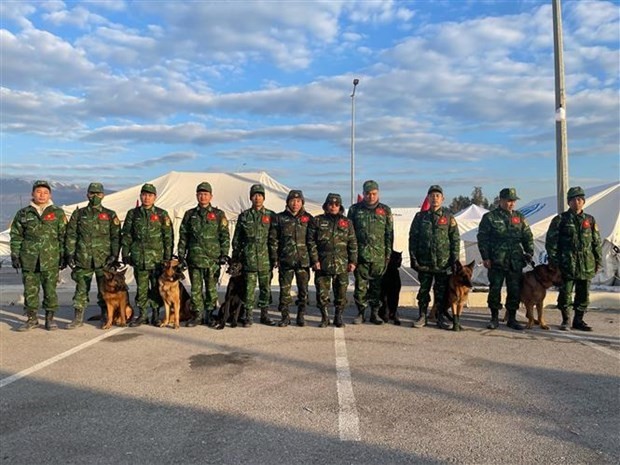
Vietnam’s search-and-rescue dogs work effectively in Turkey
Latest
 |
| Search-and-rescue dogs from Vietnam have proved helpful. (Photo: VNA) |
The six sniffer dogs have helped Vietnam People’s Army (VPA)’s search and rescue teams to detect six locations of earthquake victims and remove at least four bodies out of the debris.
Nguyen Van Nghia, leader of a dog-rescue team from VPA said that as soon as they arrived in Turkey, the team consisting of six sniffer dogs, six dog trainers, two team leaders, and a veterinarian started working. On February 14, all six dogs joined search and rescue work. They detected three locations of victims who were buried under the debris.
Vietnamese rescuers and local forces found and moved out a victim buried in the rubble.
At the other two locations, Vietnamese rescuers handed the sites over to local forces who then found three other bodies.
On February 15, four of the dogs continued working together with two Vietnamese rescue teams.
One team conducted search in Haci Omer Alpagot commune in Antakya, capital of Hatay province, under the leadership of Major General Pham Van Ty, Deputy Chief of the Standing Office of the National Committee for Natural Disaster Response and Search and Rescue and Deputy Director of the Search and Rescue Department under VPA’s General Staff.
The second team led by Senior Lieutenant Colonel Nguyen Duy Minh, Head of the US-Australia-Africa Section under the Ministry of Defence’s Department of External Affairs, assisted Bahrain's Rescue Team in searching residential areas in Harapasi Street in Antakya.
Earlier, the Bahrain team asked for help as they did not have rescue engineering equipment and professional sniffer dogs.
During the day, the Vietnamese teams searched eight locations and found three sites with victims.
Team 1 found two locations with dead victims and handed them over to local forces.
Team 2 and Bahrain entered an area that was extremely difficult to access. They then discovered the location of a victim buried in the debris of a house. Due to the large volume of concrete and narrow roads that prevented vehicles from entering, the team informed the local forces on the location for proper handling. Nghia said that a dog was cut in the leg by shards of glass and metal when it entered the cellar of this house.
The Vietnamese team on February 16 dispatched five sniffer dogs, along with military engineering and medical units to carry out the task.
The search and rescue work was carried out in severe weather conditions, with the highest temperature of 11 degrees Celsius during the day, dropping to -2 degrees Celsius at night.
According to the Turkish Disaster and Emergency Management Authority, more than 6,400 buildings in the country collapsed after the two earthquakes and more than 430 aftershocks. Some 8,300 international personnel have joined search and rescue operations in the country.

















